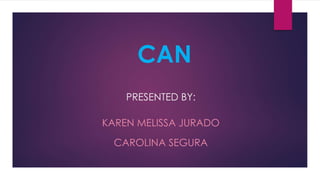Report
Share

Recommended
More Related Content
What's hot
What's hot (20)
Comparatives and superlatives + modifying comparisons

Comparatives and superlatives + modifying comparisons
Viewers also liked
Viewers also liked (17)
Modals: can, could, may, might, should, have to, must

Modals: can, could, may, might, should, have to, must
Similar to Modal Can
Similar to Modal Can (14)
More from dsm1015 (20)
Recently uploaded
Diapositivas de mi seminario "Usos y desusos de la inteligencia artificial en revistas científicas", facilitado a editores de revistas científicas de Iberoamérica en el XIII Congreso Internacional sobre Revistas Científicas (CRECS 2024), el 8 de mayo de 2024 en la ciudad de Arequipa, Perú, en el campus de la Universidad Católica de Santa María.Usos y desusos de la inteligencia artificial en revistas científicas

Usos y desusos de la inteligencia artificial en revistas científicasJuan D. Machin-Mastromatteo #Juantífico
Recently uploaded (20)
Usos y desusos de la inteligencia artificial en revistas científicas

Usos y desusos de la inteligencia artificial en revistas científicas
Los avatares para el juego dramático en entornos virtuales

Los avatares para el juego dramático en entornos virtuales
Factores que intervienen en la Administración por Valores.pdf

Factores que intervienen en la Administración por Valores.pdf
Tema 10. Dinámica y funciones de la Atmosfera 2024

Tema 10. Dinámica y funciones de la Atmosfera 2024
Prueba libre de Geografía para obtención título Bachillerato - 2024

Prueba libre de Geografía para obtención título Bachillerato - 2024
Prueba de evaluación Geografía e Historia Comunidad de Madrid 4ºESO

Prueba de evaluación Geografía e Historia Comunidad de Madrid 4ºESO
🦄💫4° SEM32 WORD PLANEACIÓN PROYECTOS DARUKEL 23-24.docx

🦄💫4° SEM32 WORD PLANEACIÓN PROYECTOS DARUKEL 23-24.docx
Tema 19. Inmunología y el sistema inmunitario 2024

Tema 19. Inmunología y el sistema inmunitario 2024
PINTURA DEL RENACIMIENTO EN ESPAÑA (SIGLO XVI).ppt

PINTURA DEL RENACIMIENTO EN ESPAÑA (SIGLO XVI).ppt
Modal Can
- 1. CAN PRESENTED BY: KAREN MELISSA JURADO CAROLINA SEGURA
- 2. VERBOS MODALES: CAN DENTRO DE LOS VERBOS MODALES COMENZAREMOS ESTUDIANDO UNO DE LOS MAS UTILIZADOS: EL VERBO CAN. SE TRATA DE UN TERMINO QUE INDICA HABILIDAD, ES DECIR LA CAPACIDAD DE REALIZAR O TAMBIEN POSIBILIDAD , O SEA QUE AKGO ES POSIBLE QUE SE CONCRETE.
- 3. EJEMPLO: • HE CAN BUILD A HOUSE: EL PUEDE CONTRUIR UNA CASA. • THEY CAN REPAIR THE CAR: ELLOS PUEDEN REPARAR EL COCHE. • IT IS EXPENSIVE BUT I CAN BUY IT: ES COSTOSO PERO YO PUEDO COMPRARLO. • YOU CAN DANCE BETTER: TU PUEDES BAILAR MEJOR.
- 4. OBSERVE QUE EL VERBO CAN SIEMPRE VA ACOMPAÑADO POR UN VERBO PRINCIPAL EN INFINITIVO Y COMO YA HEMOS VEMOS MENCIONADO, EN TERCERAS PERSONAS DEL SINGULAR NO SE LES AGREGA LA S. PARA INTERROGAR UTILIZANDO EL VERBO MODAL CAN, DEBEMOS COLOCARLO AL COMIENZO DE LA PREGUNTA.
- 5. EJEMPLO: • CAN YOU LEND ME MONEY? • PUEDES PRESTARME DINERO.? • COULD HE REPAIR THE CAR? • PUDO EL REPARAR EL COCHE?
- 6. PARA ELABORAR LA FORMA NEGATIVA DE CAN EN PRESENTE SIMPLE PUEDE UTILIZARSE CAN NOT O LA FORMMMA CONTRAIDA CAN´T. SI LO HACEMOS EN EL PASADO SIMPLE PODEMOS COLOCAR COULD NOT O LA CONTRACCION COULDN´T.
- 7. EJEMPLO: • HE CAN NOT TRAVEL TO EUROPE. • - HE CAN´T TRAVEL YO EUROPE. EL NO PUEDE VIAJAR A EUROPA. • SHE COULD NOT STUDY THE LESSON. • - SHE COULDN´T STUDY THE LESSON. ELLA NO PUDO ESTUDIAR LA LECCION.
- 8. OTRO DETALLE QUE DEBEMOS TENER EN CUENTA ES QUE EL VERBO CAN NO TIENE FORMA INFINITIVA, ES DECIR NO SE LE AÑADE TO ADELANTE. SOLAMENTE PODEMOS UTILIZAR CAN EN PRESENTE Y SU PASADO SIMPLE COULD. EN EL CASO DE ORACIONES EN FUTURO SIMPLE O EN TIEMPOS COMPUESTOS Y CONTINUOS DEBEREMOS COLOCAR TO BE ABLE QUE SIGNIFICA "SER CAPAZ DE" EN SU FORMA CORRESPONDIENTE
- 9. EJEMPLO: • HE CAN DO THE EXERCISES. • EL PUEDE HACER LOS EJERCICIOS. • HE COULD SELL THE TICKETS. • EL PUDO VENDER LAS ENTRADAS. • HE WILL BE ABLE TO SING AT THE THEATRE. • EL SERA CAPAZ DE CANTAR EN EL TEATRO.